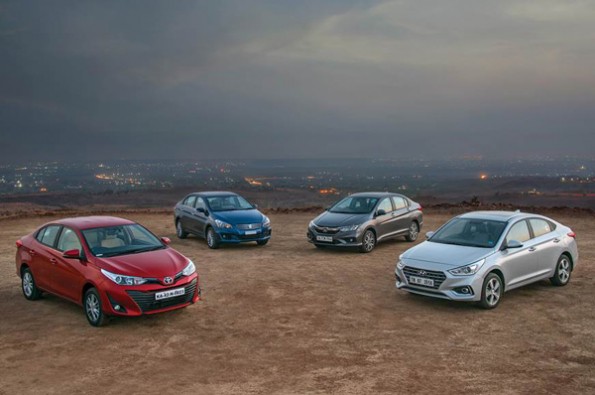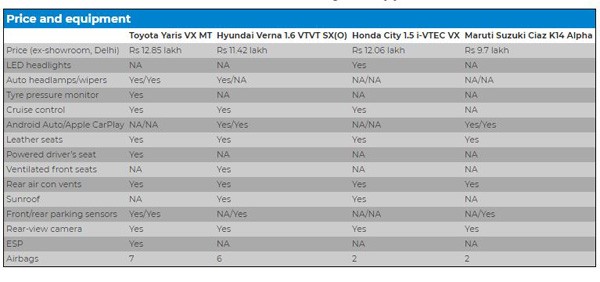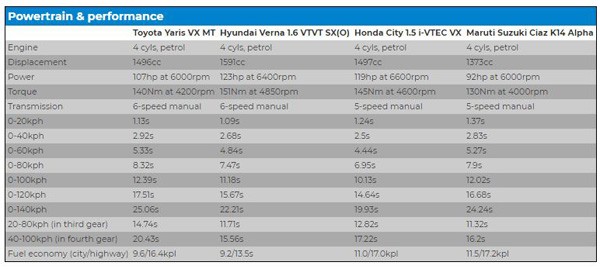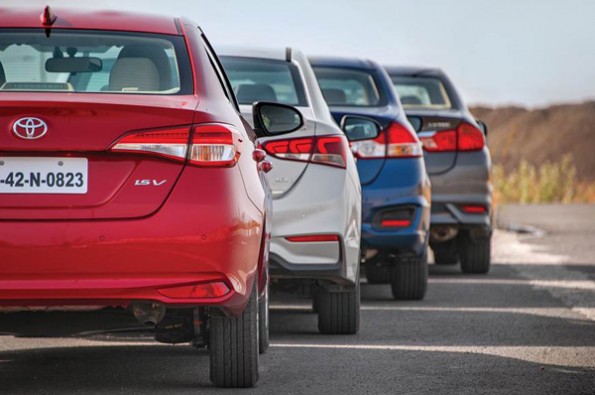We put the new Toyota up against the Hyundai Verna, Honda City and the Maruti Suzuki Ciaz. These cars were chosen because they are biggest sellers in the segment. Not only us but most buyers of a car in this segment will also compare the new Toyota against these cars.
The newest Verna finally has the potential to go with its design. The City also got an update last year making it more appealing and Maruti’s Ciaz is now being sold through Nexa. The Ciaz will also get a facelift and new motor this year. However, when you consider that the sales of the outgoing model are a bit poor it’s still relevant.
We decided to compare petrol-manual models, since they are the highest sellers. Toyota has priced the base variant of the Yaris at Rs 8.75 lakh while the top model goes up to 12.85 lakh. The Verna, on the other hand will cost you Rs 11.42 lakh, the City will set you back 12.06 lakh and the Ciaz Rs 9.7 lakh (all-prices, ex-showroom, Delhi). As you may have noticed the Yaris is the priciest car here. Let’s find out if it is worth the extra cash.
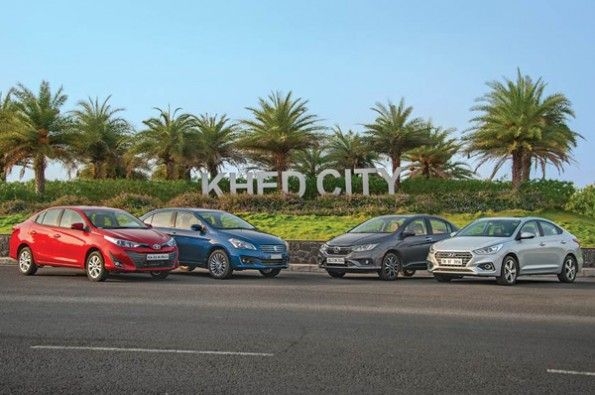
On the outside
Sometime ago, Toyota’s boss had promised that it would non more make cars that were boring. While the overall design of the car is safe, the front is quite quirky by Toyota’s standards. We found it to be striking but not gelling well enough with the rest of the design. The car also has large headlights. Towards the rear not much has changed aside from the small 15-inch wheels.
While Toyota has worked hard to make the Yaris look unique. Hyundai who are known for their unique design have made the new Verna less extravagant. The car has no extreme lines and the flow is simple unlike older models. We found the new car to look neat and like an updated model rather than an all-new design. Furthermore, the grille and headlights on the Verna look neat as well.
The new City’s headlights are the biggest feature. Not only do they work well but look good too. The last update brought a chrome grille and fancier alloys to give it a styling refresh.
Maruti’s Ciaz has aged well. It was a smartly designed sedan to begin with and the styling can be considered to be conservative. The new update has brought a bit of freshness to the design. Additionally, it is largest sedan in this comparison.
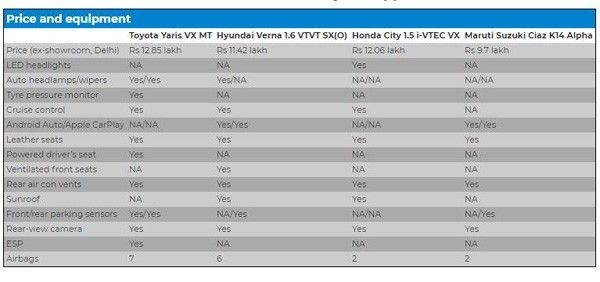
On the inside
The dashboard in the Yaris looks unique and well-designed. The screen is positioned well; the car has climate control and another screen near the dials. The car also has an eight-way adjustable seat and a narrow foot well. Even though there is extensive use of beige, the car doesn’t feel posh inside. Lastly, the mock stitching on the steering doesn’t look very real.
On the inside, the Verna feels the best with a confirming thunk. The cabin is built well and the best thing about it is the knitted roof lining. The car also has a neatly laid out dashboard with a good view. You sit considerably low and there is a nice view out. One also has to give credit to Hyundai for adding front-seat ventilation.
In the Honda City, things are a bit different and in terms of comfort it’s the best one out there. The front seats are large and well-cushioned. The steering wheel can be adjusted in way that it can give you the best driving position. The Facelift has also made the cabin a nice place to be.
It is properly simple in Maruti’s Ciaz. The dash is well-designed and quality levels are high. However, if you look closely you will notice that some switches align well. The comfort in the front is pretty good but the seat might positioned a bit high.
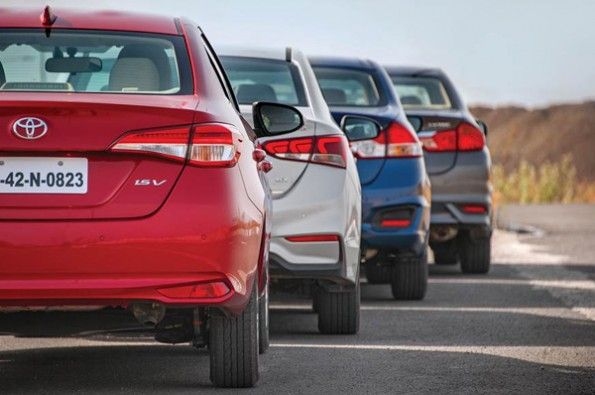
How do they compare on features?
The top-of-the-line Yaris is the priciest mid-size sedan. However, it does get a few segment first features to justify the high price. It has quite a long list – electronic driver’s seats adjust, front parking sensors, rain-sensing wipers and tyre air pressure monitor. Where the Yaris shines the most is in terms of safety. The car comes with seven airbags and the top-spec car also gets rear disc brakes.
Hyundai’s Verna in the top-spec model is quite feature-rich. While it misses out on the electronic tech, it does feature six airbags. It is also the only car in the segment with ventilated front seats. Moreover, the car also gets a sunroof however this can be found in the Honda as well.
Honda’s City gets LED headlights and a two-way adjustable steering. Disappointingly though, the Honda won’t sell the City petrol-manual in the highest spec variant. The top variants get auto headlights and wipers and see the addition of side and curtain airbags.
Maruti’s Ciaz features the least amount of tech. It feels watered down when compared to its competition. However, one can’t hold that against it because it’s a good deal cheaper than its rivals. It does get many modern day features but there are other vehicles in the company’s line-up that are heavier in terms of features. Maruti Suzuki is planning to fix this issue with the upcoming update.
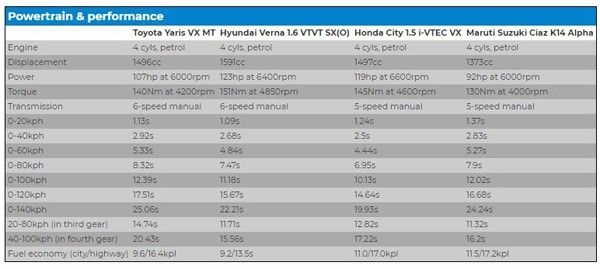
How do they compare on performance?
Toyota’s Yaris features a 1.5-litre motor that makes 107hp and 140Nm of torque. This puts it exactly in the middle compared to its rivals. While it manages to be adequate for the city, you can’t ask more from it. To get going you are required to downshift from time to time. The Yaris also has the slowest 0-100kph time of all the cars.
The Hyundai Verna uses a 123hp and 151Nm motor making it the most powerful in its segment. The Verna feels ready-to-go around town. You can even get away with driving in a single gear without much stress from the engine. It feels refined and quiet.
The City’s motor is the opposite – It feels loud. While it may be too loud, a few buyers may actually like it because it provides a raw sound. However, when you push the accelerator pedal it the 119hp and 145Nm motor delivers. The car has an impressive top-end which also gives it the segment best 0-100kph time of 10.13sec.
Maruti’s 92hp, 130Nm unit is the most underpowered here. It feels dull and but surprisingly it does have the most responsive throttle. This helps it manage City traffic and the low-kerb weight does the same. However, when you pick up the speed the power turns flat. The car doesn’t have much of a mid or top-end. The lack of power is majorly felt on the highway.
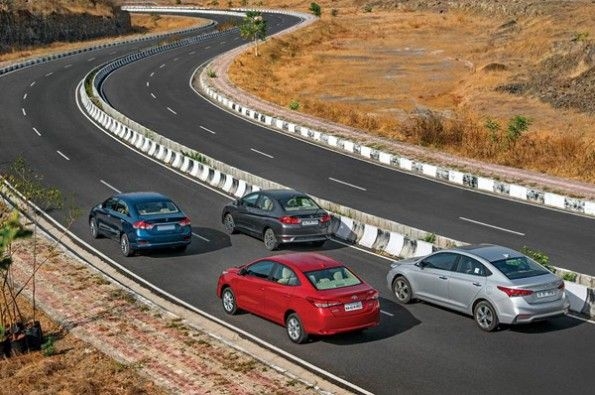
Which one should you buy?
Toyota’s Yaris is a car that is very capable. It does this without being perfect at any one thing in particular. It comes across as a bit simple and lacks the pull of a car with a Toyota badge. While it may have the highest safety levels, it still feels a bit expensive.
At the other end spectrum is Maruti’s Ciaz which appears to be the most value for money. It is spacious and peppy while being efficient too. With the Ciaz, you get a lot for your money, but it still isn’t the best out there. It has a boring motor and lacks many features.
If you are going to be driven around, the City is the car for you. It has the best rear seat in its segment. Buyers will also like it for its motor for the top-end performance. However, it isn’t the best car out there. The City is also the noisiest of the sedans.
Then comes the Hyundai Verna, it’s a sedan that tops this list. Overall, the car delivers well in terms of quality and refinement. The rear-seat space is limited and the fuel-economy is just mediocre but these are not deal breakers. The Verna is the best petrol-manual mid-size sedan available today.
